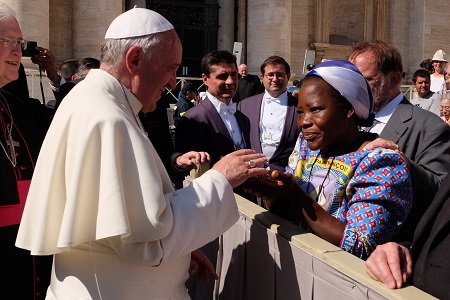CNN — As Pope Francis prepares to visit the United States for the first time, the world is waiting to hear what he will say about key issues facing the church.
The Pope is known for tackling sensitive topics head on. But for all his surprises and proclamations, what has Pope Francis done to address the issues facing the Roman Catholic Church?
Sex Abuse
“I feel compelled to take personal responsibility for all the evil that some priests, many — many in number, (although) not in comparison with the totality — to assume personal responsibility and to ask forgiveness for the damage caused by the sexual abuse of the children. The church is aware of this damage. We don’t want to take a step back in dealing with this problem and the sanctions that must be imposed.”
— Vatican Radio, April 11, 2014
In June 2015, Francis created a church tribunal to judge bishops who fail to protect children from sexually abusive priests. Since then, two U.S. bishops accused of covering up crimes of priests have stepped down.
In March 2014, the Pope met with six victims of church sexual abuse — not the first such meeting between a pope and sex-abuse survivors, but it was the first of his papacy. On March 22, Francis appointed the Pontifical Commission for the Protection of Minors, headed by Boston’s archbishop, Cardinal Sean P. O’Malley.
Previously, Francis had called for “zero tolerance” of sexual abuse by clerics, but critics accused the Vatican of being more talk than action.
Environment
“The Earth, our home, is beginning to look more and more like an immense pile of filth. In many parts of the planet, the elderly lament that once beautiful landscapes are now covered with rubbish.”
— June 18, 2015, Encyclical Laudato Si’: On the Care of our Common Home
Pope Francis released a comprehensive statement about the environment, calling for “cultural revolution” to change our lifestyles — ranging from materialistic distraction to our addiction to technology to our treatment of the poor.
And the Pope wasn’t only talking to his Catholic flock. Francis said his letter was addressed to “every person living on this planet.”
Citing scientific consensus on global warming, “doomsday predictions,” warned Francis, “can no longer be met with irony or disdain.”
The Pope criticized big business, oil companies and politicians that he said seek profit over the betterment of life on the planet and called out the media for being shortsighted. He said humanity’s “reckless” behavior has pushed the planet to a perilous “breaking point.”
“Yet all is not lost,” Francis said. “Human beings, while capable of the worst, are also capable of rising above themselves, choosing again what is good, and making a new start.”
The encyclical was published in at least five languages and was more than a year in the making, church officials said, drawing on the work of dozens of scientists, theologians, scholars and previous popes.
Women
“It is not enough to have altar girls, women readers. … Women in the church are more important than bishops and priests,” just as “Mary is more important than the apostles.”
— July 28, 2013, press conference
In 2013, Pope Francis said, “On the ordination of women, the church has spoken and said no,” and critics say he has been vague about what his pledge of “greater roles” for women in Catholicism would look like.
Pope Francis has come out in favor of increasing women’s roles in the church, appointing women to a few powerful Vatican positions, including the committee to combat sex abuse in the Catholic Church, with roughly half of that 17-member committee made up of women. There is also a female member of the supervisory board for the Vatican bank. Sister Donna Markham is the first female president of Catholic Charities — which supports more than 70,000 employees and serves 10 million across the United States — in its 105-year history.
According to Vatican Radio, just 18% of the Vatican’s workforce is female, including employees at Vatican museums, post offices and the Holy See that governs the Roman Catholic Church.
Abortion
“The forgiveness of God cannot be denied to one who has repented, especially when that person approaches the Sacrament of Confession with a sincere heart in order to obtain reconciliation with the Father.”
— Pope’s letter on the Extraordinary Jubilee of Mercy, September 1, 2015
Pope Francis shocked many this month when he announced that priests will be authorized to forgive the “sin of abortion” when the church begins a “Year of Mercy” on December 8.
The catechism of the Catholic Church says that a person who procures an abortion incurs automatic excommunication, a penalty that often only a bishop can lift. But some experts in the Catholic canon law expressed confusion about the practical effects of the Pope’s announcement.
“It’s another signal that the Pope wants a church of encounter that journeys with people,” said John Gehring, Catholic program director at Faith in Public Life. “He recognizes the church is anchored in the Gospel when mercy trumps finger-wagging judgment.”
Homosexuality
“If they accept the Lord and have good will, who am I to judge them? They shouldn’t be marginalized. The tendency (to homosexuality) is not the problem. … They’re our brothers.”
— July 28, 2013, press conference
Similar to his comments on abortion, Pope Francis has yet to reverse church doctrine on the issues of homosexuality or same-sex marriage, but he has changed the way the church publicly talks about homosexuality.
Francis floated the idea that the church could support civil unions in an interview with an Italian newspaper on March 5, 2014. He reiterated the church’s longstanding teaching that “marriage is between a man and a woman,” but said, “We have to look at different cases and evaluate them in their variety” — the first time a pope has spoken on acceptance of civil unions, according to Catholic News Service.
CNN’s Daniel Burke contributed to this report.
